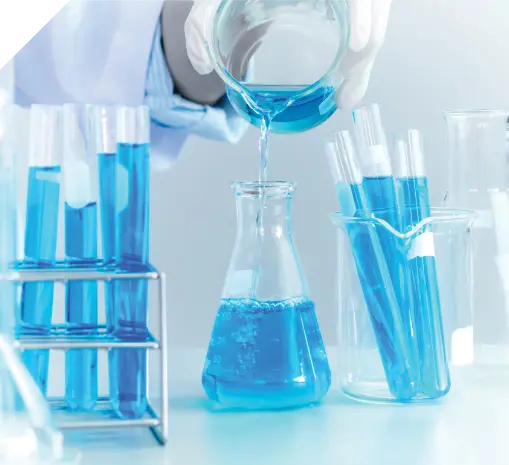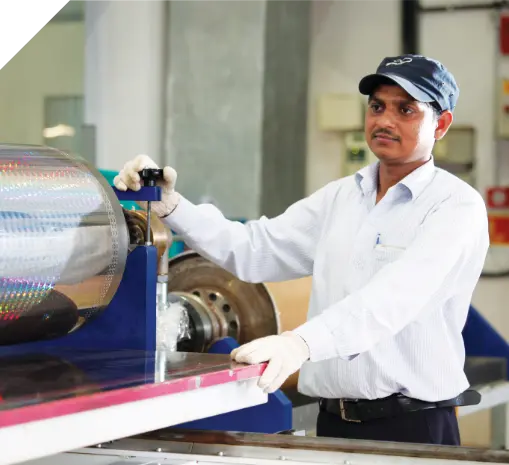X
of R&D spends
strong R&D workforce
patents granted up to FY25
Businesses should provide goods and services in a manner that is sustainable and safe
Investors | Customers
Regulatory Bodies
Innovation, Research & Development | Total Quality Management
Employment
As part of our R&D initiatives, we partner with our clients to jointly develop customised products and processes. These joint efforts have consistently led to successful outcomes, reinforcing a culture of partnership with our customers.
At SRF, our Chemicals Technology Group (CTG) is leading our innovation journey to introduce novel chemistries and next-generation products for the Fluorochemicals and Specialty Chemicals business. We focus on developing cutting-edge product and process technologies, especially intermediates that meet the growing needs of Active and Non-Active Ingredients for agrochemical and pharmaceutical sector. We are also working on enabling continuous development of new-age products including refrigerants and maintaining our journey of excellence and sustainability.
For over two decades, the CTG group has been at the forefront of business growth in fluorinated molecules. They consistently introduce new chemistries, successfully scaling them for commercial use and create both complex and innovative products to satisfy customer demands and market trends.
With a strong team of over 500 professionals across our R&D sites and specialised centres, we bring deep technical expertise and collaborative strength to everything we do. Our R&D team worked on over 50 molecules and many products were successfully taken up for process development. Additionally, more than 35 molecules were taken up for the scale-up studies and ~50% have been commercially produced in multipurpose and dedicated plants.
During the year, the CTG filed 38 patents, taking the total count to 481 filed so far. Two patents were granted during the year, taking the total count of patents granted till date to 151. By focussing on seamless scale-up and commercialisation, we are constantly building our capabilities to take ideas from the lab to market – strengthening our position as a leader in chemical innovation.
Our Technical Textiles Business in Manali, near Chennai, is supported by a state-of-the-art R&D facility that serves as a hub for innovation and process advancement. Equipped with advanced infrastructure and a dedicated pilot plant, the centre facilitates polymerisation, spinning, twisting, and dipping activities – enabling the development of next-generation products and manufacturing processes.
Our advanced R&D centre at the Indore SEZ, is equipped with a full range of modern facilities, including a pilot polymerisation plant and pilot-scale equipment for printing, lamination, and coating. It also houses high-end analytical instruments, allowing us to simulate and optimise customer processes at a pilot scale. This well-integrated setup plays a vital role in accelerating phases of product development, enabling faster transition from concept to commercialisation.

Our R&D and business development teams regularly work in close partnership with customers to co-create products and processes tailored to their specific needs. This collaborative approach has enabled us to consistently deliver successful outcomes, strengthen mutual trust and foster long-term partnerships. Over the years, we have engaged with leading agrochemical innovators to develop solutions aimed at advancing the agriculture sector. Simultaneously, we are working with partners to bring more complex downstream products to market, expanding our technical capabilities and product portfolio.
Our strong foundation in chemistry is a key driver of our innovation and product development journey. Backed by a team of seasoned professionals with expertise across multiple chemical disciplines, we are well-equipped to address complex challenges and create impactful solutions.
This expertise of our professionals translates into a growing portfolio of patents and a consistent track record of successfully bringing new products to market, highlighting our ability to transform knowledge into tangible value.

Across our diversified business segments, we have made significant strides in innovation and new product development.
We introduced five agro-products, and three pharma products tailored to the agrochemical and pharmaceutical industries. These offerings hold strong long-term potential and are positioned at various stages of market development, expected to become key growth drivers.
We expanded our portfolio by launching 12 new products, aligning with evolving industry needs.
We commissioned new types of belting fabrics during the year. Its higher tensile strength will be supporting multiple industrial applications.

Successfully stabilised and scaled up the new Hot Lamination (HL) machine which will help enhance our production of Laminated Fabrics.
Safeguarding the security and confidentiality of our information systems is critical to ensuring smooth and uninterrupted operations. At SRF, we have a well-defined cyber risk management policy in place, supported by robust systems designed to prevent and respond to cyber threats effectively. We have implemented a variety of systems to mitigate cybersecurity risks, including SentinelOne Antivirus and Endpoint Detection and Response (EDR), layered firewalls with critical zone segregation, and Netskope Secure Web Gateway. Our security framework also incorporates Zero Trust Network access, Cloud Access Security Broker (CASB), and secure identity management with Multi-Factor Authentication (MFA).
Additionally, we have robust controls such as secure data centres, encrypted protection of intellectual property using IRM solutions, and the use of secure VPNs to prevent unauthorised access or data exfiltration. Alongside technical measures, we regularly conduct employee awareness sessions to build cyber readiness across the organisation and foster a culture of digital responsibility.
During the year, we established a robust hybrid cloud infrastructure, successfully migrating all core applications to Oracle Cloud Infrastructure and Microsoft Azure. Network optimisation ensured shortest-path connectivity from all manufacturing sites to cloud data centres, enabling seamless application performance. This migration was executed with zero disruption and has resulted in improved efficiency and reliability across systems. We embedded advanced cloud security protocols within the infrastructure design, leading to stronger segregation, granular access controls, and enhanced protection against external threats and data exfiltration risks. The upgraded infrastructure now offers high scalability, supporting our long-term digital and business growth objectives.
To safeguard and manage personal and customer data breaches, we have implemented several measures. All laptops and PCs are encrypted, and USB access is restricted for users. Our Cloud Access Security Broker solution prevents access to public cloud storage. Additionally, Data Loss Prevention (DLP) tools monitor the movement of intellectual property and block unauthorised data transfers. Access to servers and databases is limited to privileged users and is subject to monitoring. Furthermore, we utilise the services of Cyble for Dark Web monitoring to detect any instances of our data being published.
Further, we strengthened our cybersecurity framework by deploying modern security solutions such as secure web gateways, zero trust network architecture, and cloud access security broker (CASB) capabilities. To mitigate email-based threats, we introduced AI-driven mail threat detection to proactively counter phishing attacks. In parallel, we conducted a comprehensive security assessment of our Manufacturing Operations Technology (OT) landscape and implemented enhancements to fortify its resilience.
As part of our trainings and awareness on cyber security, we organised multiple training sessions to enhance employee awareness on IT infrastructure. The trainings included e-learning security awareness solution provided by Trend Micro i.e., the Phishing Insight program. This training is conducted periodically and covers a range of security threats, including phishing, identity theft, safe browsing practices, data protection, social engineering, malware protection, and business email compromise, among others.
For more details on mitigating cybersecurity risks, please refer to Principle 9 of our BRSR Report.
To accelerate our enterprise-wide transformation, we have invested in advanced, scalable digital platforms focussed on process digitisation, digital workflows, analytics, automation, mobile applications, and cloud-based solutions. These initiatives have significantly enhanced our productivity, decision-making capabilities and modernised our IT infrastructure with cutting-edge technology.
During the year, we transitioned from manual processes to digital formats using Business Process Management software and Low Code/No Code solutions. This shift has allowed us to replace paper-based workflows with efficient digital alternatives thereby saving time and become less error-prone. The initiatives include the automation of Advance Requisition, Sanction Note approvals, Master Data management and processing of vendor bills by the Shared Services Centre (SSC). Additionally, we have implemented energy efficiency IoT shop floor digitisation projects across multiple plants, further enhancing our operational efficiency.
Improve process efficiency and drive innovation
Brings competitive advantage, and enable cost efficiencies
Encourages collaboration, internalise best practices, enhances employee performance
Adopting of green technologies and processes to maximise resource efficiency
Builds strong networks and partnerships to generate a positive societal impact